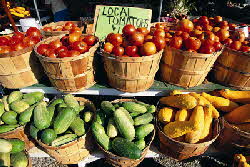EATING LOCALLYLocal Food Producers and Environmental QualityDear EarthTalk: Why do environmentalists advocate that people “eat locally?” I don’t understand the connection between patronizing local food producers and environmental quality.
-- Timothy Douglas, Burlington, Vermont
In our modern age of food preservatives and additives, genetically altered crops and E. coli outbreaks, as with the recent spinach debacle, people are increasingly concerned about the quality and cleanliness of the foods they eat. Given the impossibility of identifying the pesticides used and the route taken to grow and transport, say, a banana from Central America to our local supermarket, foods grown locally make a lot of sense for those who want more control over what they put into their bodies.
John Ikerd, a retired agricultural economics professor who writes about the growing “eat local” movement, says that farmers who sell direct to local consumers need not give priority to packing, shipping and shelf life issues and can instead “select, grow and harvest crops to ensure peak qualities of freshness, nutrition and taste.” Eating local also means eating seasonally, he adds, a practice much in tune with Mother Nature. Photo courtesy of Getty Images
 “Local food is often safer, too,” says the Center for a New American Dream (CNAD). “Even when it’s not organic, small farms tend to be less aggressive than large factory farms about dousing their wares with chemicals.” Small farms are also more likely to grow more variety, too, says CNAD, protecting biodiversity and preserving a wider agricultural gene pool, an important factor in long-term food security. Eating locally grown food even helps in the fight against global warming. Rich Pirog of the Leopold Center for Sustainable Agriculture reports that the average fresh food item on our dinner table travels 1,500 miles to get there. Buying locally-produced food eliminates the need for all that fuel-guzzling transportation.
Another benefit of eating locally is helping the local economy. Farmers on average receive only 20 cents of each food dollar spent, says Ikerd, the rest going for transportation, processing, packaging, refrigeration and marketing. Farmers who sell food to local customers “receive the full retail value, a dollar for each food dollar spent,” he says. Additionally, eating locally encourages the use of local farmland for farming, thus keeping development in check while preserving open space.
Portland, Oregon’s EcoTrust has launched a campaign, the Eat Local Challenge, to encourage people to eat locally for a week so they can see---and taste--the benefits. The organization provides an “Eat Local Scorecard” to those willing to try. Participants must commit to spending 10 percent of their grocery budget on local foods grown within a 100-mile radius of home. In addition they are asked to try one new fruit or vegetable each day, and to freeze or otherwise preserve some food to enjoy later in the year.
EcoTrust also provides consumers with tips on how to eat locally more often. Shopping regularly at local farmers’ markets or farmstands tops the list. Also, locally owned grocery and natural foods stores and coops are much more likely than supermarkets to stock local foods. The Local Harvest website provides a comprehensive national directory of farmers’ markets, farm stands and other locally grown food sources. 
CONTACTS:
Center for a New American Dream, www.newdream.org/consumer/farmersmarkets.php
Local Harvest, www.localharvest.org.
GOT AN ENVIRONMENTAL QUESTION? Send it to: EarthTalk, c/o E/The Environmental Magazine, P.O. Box 5098, Westport, CT 06881 USA; submit it at: www.emagazine.com/earthtalk/thisweek/; or e-mail: earthtalk@emagazine.com .
| 